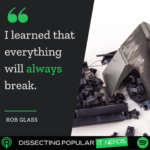[03:45] You run an MSP and you’ve been around for quite a while, is that right?
My father started the company in 1984. MSP wasn’t a thing in the 80s, so that’s a new badge. We are an IT solutions company.
[04:25] How did your father start the company?
He started it in the garage, but he saw the value of commercial space and moved within a few months.
[05:35] What spaces do you work in?
We do well in small and medium spaces. We take huge enterprise services and boil them down to small and medium business needs.
[07:15] Can you explain where managed service providers fit in with internal IT departments?
There are some businesses where we co-manage with the internal team, some where we are the entire team, and some where we just provide one managed service. We can provide better value to businesses because we can do a lot of things that a single person can’t.
[11:10] Post-COVID, what business areas are you seeing that need to increase your type of support?
We’re seeing that we can adapt and scale to a certain point, but some clients have outgrown us. It’s difficult when smaller companies are acquired by bigger ones because we don’t go along after acquisitions. While we are in Knoxville, we do see the same kind of things as in Nashville. We just keep our ears to the ground in terms of changes.
[13:25] What kind of trends are you seeing in supporting small and medium businesses?
There’s always cybersecurity. We are seeing that need increase. If you aren’t taking it to a proper level within your business, you aren’t going to be able to work with the government anymore. You can’t be a small contractor anymore in certain fields, because you won’t be able to get cyber insurance without meeting certain criteria.
[16:00} Some of the new requirements make it very difficult for small businesses to work with the government.
We have to be able to understand all of it and break it down in a way that business owners can understand. It’s a balancing act when it comes to talking costs and services. It’s about building rapport. It has to be more than a paper thing. When you build that trust it’s easy.
[18:20] What does a QBR give your clients?
Some businesses don’t even want to meet quarterly, some don’t even worry about meeting annually. A quarterly business review is important; we’re reviewing everything from hardware health to that the endpoint is. We are pulling in data points to generate reports about performance and overall cyber health. We work to adapt to the business’ needs when making reports.
[20:57] Tell us about your journey in IT.
Obviously, my perspective is skewed toward my father’s experiences and values. He started this company because he was out on deployment working for a bank and missed my first birthday, and he said “never again.” He made a company so that he could have the job he wanted to work in. That “Mr. Fix It” mentality was always at the forefront. I eventually got an electrical engineering degree with a focus on digital design. I came back to the company 9 years ago.
[25:30] What did you bring from the tech side of things that helped with the business side of things?
I worked at Patagonia for a while, and it helped me truly think about the people behind the screen. You have to care for the people behind it.
[29:33] How do you translate your mentality to your team?
We have core values that explain our goals and we give those to our team. It’s how we evaluate our team and our clients.
[34:40] How do you attract the talent that you need?
We value our people with appropriate pay. It’s difficult as a small business and with the remote boom. But, we’re here for work-life balance.
[41:40] What do CEOs need to ask to make sure they make the right decision for an MSP?
Be more centered around results over branding and acronyms. Look for communication that you understand, and not a sales pitch.



